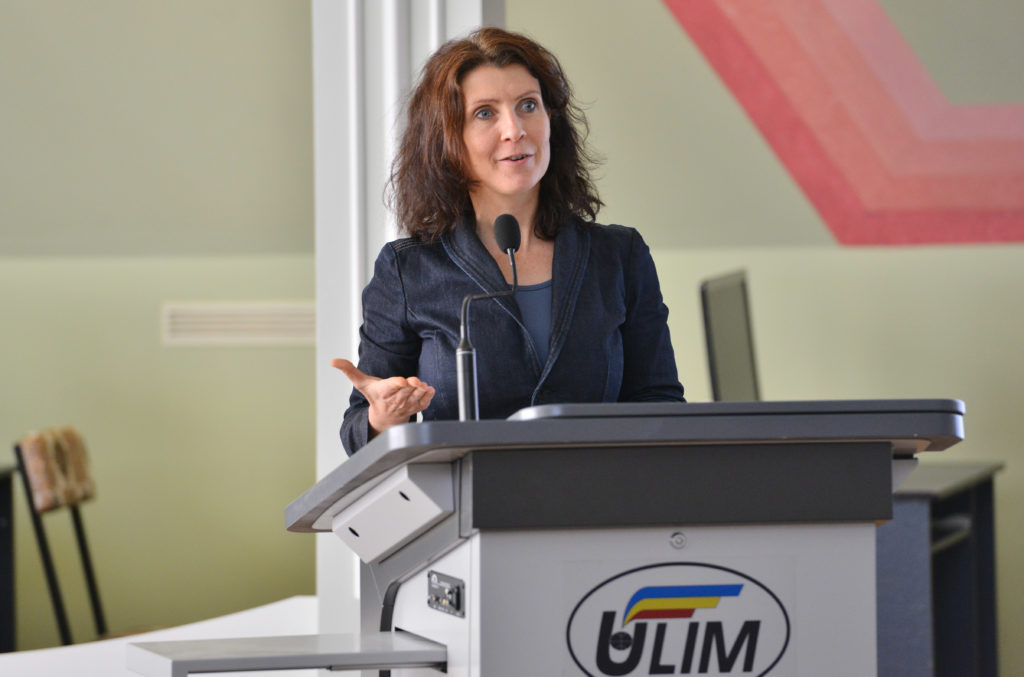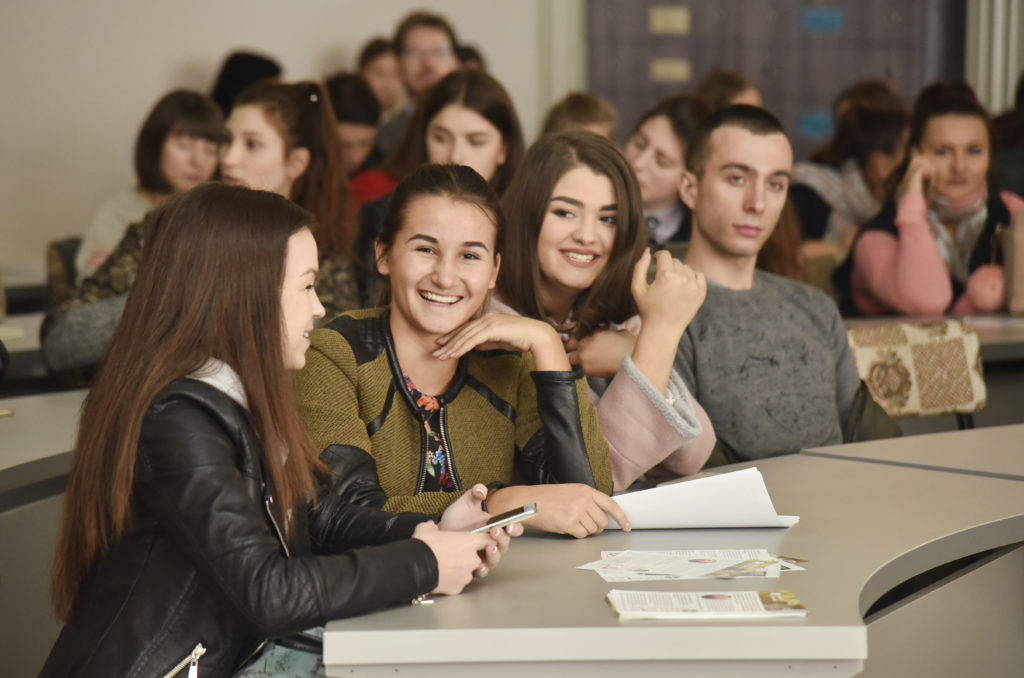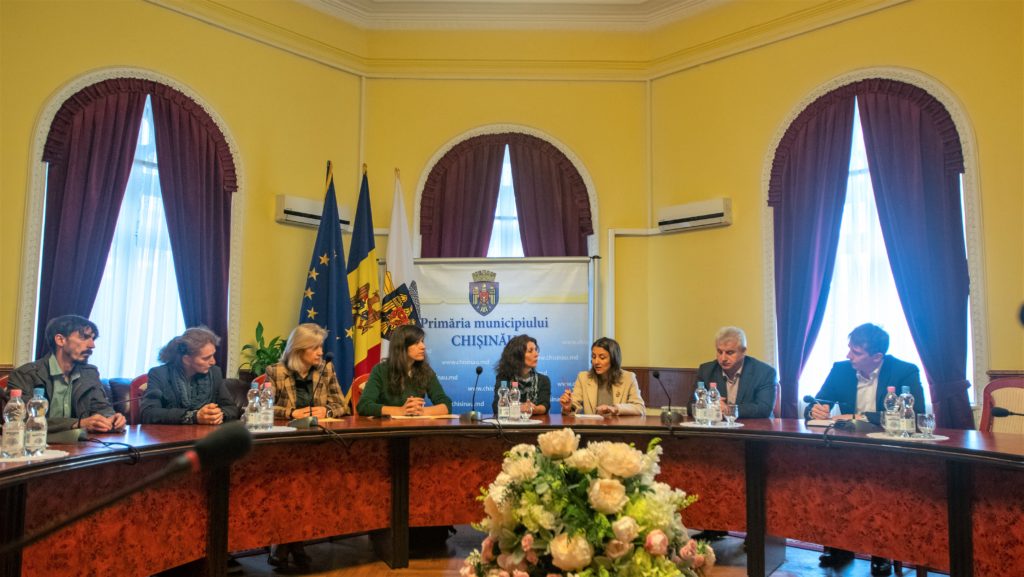O governo local da Moldávia promete uma melhor política de bem-estar animal aos protetores de animais locais após a visita da deputada holandesa Esther Ouwehand
Last weekend – for the first time in Moldova’s history – a lecture was given on the importance of animal rights. Dutch MP for the Party for the Animals Esther Ouwehand held the lecture at a university in the capital Chișinău, in a packed lecture hall. After that, Ouwehand talked with local animal protectionists and experts in the field of organic arable farming. The council of Chișinău promised Ouwehand that a professional centre for sterilisation and vaccination of stray animals will soon be opened.

The lecture was held at the invitation of animal rights lawyer Ion Dron. During her lecture, Esther Ouwehand pictured how the efforts made for the welfare of animal also benefit people. She showed that society needs to be more connected with nature and that it should be led by compassion.
After the lecture, Ouwehand talked with several animal protectionists, who all pointed out the lack of regulations and legislation for the protection of animals in Moldova. Lawyer Dron wrote a legislative proposal in cooperation with a Moldovan NGO, which proposal is to legally enshrine the adequate protection of animals. Animal protectionists are now fighting together for adoption of this legislative proposal by the Moldovan Parliament.
Ouwehand was impressed by the many brave people in Moldova who dare to stand up for the interests of animals. And they do so quite successfully: animal protectionists’ protests helped to close down the dolphinarium of Chișinău . Also, a first step was taken against animal abuse by making cruelty against animals punishable in the Moldovan Penal Code.
Ouwehand: “Choosing the interests of the vulnerable instead of the right of the strongest can be done close to home too. The cruel treatment of (stray) animals is not acceptable in a civilised country. And we are so happy to see that here in Moldova brave people are standing up for the interests of animals and with that for the Moldovan people themselves. Wonderful!”

Agriculture
Ouwehand praised the fact that Moldova is doing relatively well within the region in the field of organic arable farming, where nutritious crops are grown, such as walnuts, fruit, beans and sunflower pits. However, she warned for the growing lobby of foreign companies to expand industrial livestock farming in Moldova. Now that the Western livestock industry is suffering a crisis and people in the West are less tolerant of the industry destroying their living environment, it sees opportunity to move its polluting practices to Eastern-Europe.
Ouwehand: “Moldova is well capable to provide food for the future: it has fertile soils and a great variety of crops, as a result of which a natural resistance against insects and plagues can be cultivated. Agriculture without overfertilisation and pesticides, with plenty of vegetable proteins for human consumption: that is what Europe needs. We hope that Moldova will not make the same mistake as the West did and will oppose to importing Western livestock practices, as this would mean a disaster for Moldova’s nature, animals, people and the environment.
Municipal policy

Moldovan animal protectionists told Ouwehand that local governments do very little to achieve animal welfare and that they even actively participate in the cruel approach of stray animals by facilitating so-called “Killing Stations”. That is why Ouwehand, together with animal protectionists, talked with the political advisor of the Mayor of Chișinău.
The council admitted that a lot can be improved in the area of animal welfare policy. The Mayor’s advisor then promised that the council will start to conduct an animal-friendly stray animals policy soon. The first step towards this is the opening of a professional centre for the sterilisation of stray dogs, where 50 dogs can be looked after and treated according to European standards. Ouwehand told the Mayor’s advisor that she will follow the progress through the local animal welfare organisations.
During the meeting with the council, animal rights lawyer Dron again emphasised why an appropriate animal welfare policy is essential: “Animal welfare is not only important for animals, but also for the entire society. An inadequate animal welfare policy will harm our society as a whole.”
No último fim de semana – pela primeira vez na história da Moldávia – foi dada uma palestra sobre a importância dos direitos dos animais. A MP holandesa do Partido para os Animais Esther Ouwehand realizou a palestra em uma sala de aula lotada, em uma universidade na capital Chișinău. Depois disso, Ouwehand conversou com ativistas e protetores de animais e especialistas locais no campo da agricultura orgânica. O conselho de Chișinău prometeu a Ouwehand que um centro profissional de esterilização e vacinação de animais de rua será aberto em breve.

A palestra foi realizada a convite do advogado com foco em direitos dos animais, Ion Dron. Durante sua palestra, Esther Ouwehand retratou como os esforços feitos para o bem-estar animal também beneficiam as pessoas. Ela mostrou que a sociedade precisa estar mais conectada com a natureza e que deve ser conduzida pela compaixão.
Após a palestra, Ouwehand conversou com vários ativistas e protetores de animais, ao qual todos apontaram a falta de regulamentos e legislação para a proteção de animais na Moldávia. O advogado, Dron escreveu uma proposta legislativa em cooperação com uma ONG da Moldávia, cuja proposta é legalmente consagrar a proteção adequada dos animais. Ativistas e protetores de animais estão agora a lutar juntos pela adoção desta proposta legislativa pelo Parlamento da Moldávia.
Ouwehand ficou impressionada com as muitas pessoas corajosas na Moldávia que se organizam para defender os interesses dos animais. E eles o fazem com bastante sucesso: protestos de ativistas e protetores de animais ajudaram a fechar o delfinário (dolphinarium) de Chișinău. Além disso, um primeiro passo foi dado contra o abuso de animais, a tornar a crueldade contra animais punível no Código Penal da Moldávia.
Ouwehand: “Escolher os interesses dos vulneráveis em vez do direito dos mais fortes pode ser feito perto de casa também. O tratamento cruel de animais (abandonados) não é aceitável em um país civilizado. E estamos tão felizes em ver que aqui na Moldávia as pessoas corajosas se levantam pelos interesses e direitos dos animais, assim como os do próprio povo moldavo.Admirável!”

Agricultura
Ouwehand elogiou o fato de que a Moldávia está se saindo relativamente bem na região, no campo da agricultura orgânica, onde cultivos nutritivos são cultivados, como nozes, frutas, feijões e caroços de girassol. No entanto, ela alertou para o crescente lobby de empresas estrangeiras para expandir a pecuária industrial no país. Agora que a indústria pecuária ocidental está a sofrer uma crise e as pessoas no Ocidente são menos tolerantes com indústrias que destrói o meio ambiente, essa mesma indústria vê a oportunidade de levar suas práticas poluidoras para a Europa Oriental.
Ouwehand: “A Moldávia é bem capaz de prover alimento para o futuro: tem solos férteis e uma grande variedade de cultivos, como resultado do qual uma resistência natural contra insetos e pragas pode ser cultivada. Agricultura sem fertilizações e pesticidas excessivas e com abundância de proteínas vegetais para consumo humano: é disso que a Europa precisa. Esperamos que a Moldávia não cometa o mesmo erro que o Ocidente e se oponha à importação de práticas pecuárias ocidentais, pois isso significaria um desastre para a natureza, os animais, as pessoas e o meio ambiente da Moldávia.”
Política municipal

Ativistas e protetores de animais da Moldávia nos disseram que os governos locais fazem muito pouco para alcançar o bem-estar animal, e que ainda por cima, participam ativamente da abordagem cruel dos animais de rua, a facilitar, as chamadas “Estações de Morte”. É por isso que Ouwehand, juntamente com ativistas e protetores de animais, conversou com o assessor político do prefeito de Chișinău.
O conselho admitiu que muito pode ser melhorado na área da política de bem-estar animal. O conselheiro do prefeito prometeu então que em breve, o conselho começará a implementar uma política mais amigável aos animais de rua. O primeiro passo para isso é a abertura de um centro profissional para a esterilização de cães de rua, onde 50 cães podem ser tratados de acordo com os padrões europeus. O conselho também prometeu que os carros em que os animais de rua são transportados serão feitas melhorias antes da abertura do centro de atendimento. Os carros serão equipados com gaiolas apropriadas e um sistema de ventilação. Ouwehand disse ao conselheiro do prefeito que ela irá acompanhar o progresso através das organizações locais de bem-estar animal.
Durante a reunião com o conselho, o advogado de direitos dos animais, Dron novamente enfatizou por que uma política apropriada de bem-estar animal é essencial: “O bem-estar animal não é importante apenas para os animais, mas também para toda a sociedade. Uma política inadequada de bem-estar animal prejudicará nossa sociedade como um todo ”.